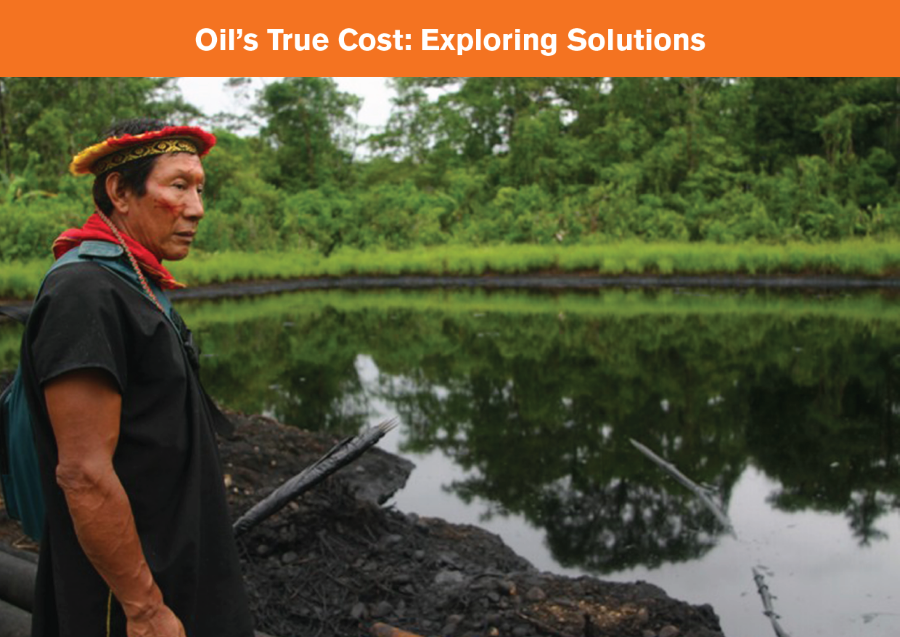
Promotional image for the EO-hosted film and discussion event at Impact Hub Oakland on February 26, featuring Hugo Lucitante's grandfather studying an open pit of crude oil in the Amazon rainforest.
There are many different approaches that can be taken to reduce the negative social and environmental impacts of irresponsible oil and gas development in the Amazon and around the world, and combining them all is the best way to achieve positive results. That was the takeaway from Oil’s True Cost: Exploring Solutions, an event hosted by Equitable Origin in Oakland, California last week. The event kicked off on Thursday evening with a screening of “Oil and Water,” followed by Q&A with one of the film’s directors and its two subjects, and wrapped up with a discussion by a panel of experts. The purpose of the event was to raise awareness of and talk over solutions to irresponsible oil development and its harmful social and environmental consequences. Ticket sales for the event supported Hugo Lucitante's Cofán Community Health Project.
The event was held at “Oil & Water,” Poritz and EO’s Director of Communications Josh Garrett took the stage with Hugo Lucitante, a member of the Amazonian Cofán tribe and Poritz’s co-subject in the documentary, and Laurel Spellman Smith, co-director of the film. Garrett facilitated a Q&A session about the film and EO’s work. Audience questions and reactions ranged from “Is EO going to certify fracking sites?” (answer: yes, EO is currently developing supplemental standards that will apply to shale drilling operations that use fracking) to “why are companies like EO that aim to assist indigenous peoples led by non-indigenous people?” (Poritz’s response: EO offers its certification model as a tool for indigenous peoples to influence development practices and does not want to take on leadership roles on behalf of indigenous communities). Audience members were also curious about what’s happened in Hugo’s village of Zábalo since the end of filming in 2013 (it is functioning much the same way as in the film, but oil development projects are moving gradually closer) and what he’s been doing (working, raising his daughter, and continuing his college education).
Finally, Garrett moderated a discussion by a diverse panel of experts on the impacts of oil and gas development and how to mitigate them: Leila Salazar-Lopez of Amazon Watch, Roger McElrath of BSR, Briana Mordick of the Natural Resources Defense Council (NRDC), and Poritz. The discussion touched on the different approaches to mitigation taken by the represented organizations: BSR and EO engage directly with oil companies and associated businesses, Amazon Watch focuses on advocacy, and the NRDC takes a three-pronged approach, mixing advocacy, legal action, and science-based industry engagement. Salazar-Lopez made clear that Amazon Watch favors stopping all oil and gas development in the Amazon, but emphasized that empowering communities like the Cofán is the best way to protect the rain forest and also called EO’s work to improve the practices at existing or imminent drilling operations “completely necessary.” Mordick explained that NRDC works for environmental conservation within the reality that oil and gas development will remain commonplace for decades to come, using all three of their approaches to make current and future development projects minimally harmful to surrounding ecosystems. McElrath described BSR’s strategy of making a strong business case to oil and gas companies (as well as other industries) for investing in better social and environmental practices.

All the participants in the Oakland event (left to right): Laurel Spellman Smith, Hugo Lucitante, Leila Salazar-Lopez, Roger McElrath, Briana Mordick, Josh Garrett, David Poritz, and Lisa Chacon.
As the evening wound down, Poritz outlined EO’s struggles to secure interest and support from nonprofit groups that he would expect to be proponents of the company’s work. But he ended the event on the note of optimism, noting that although different viewpoints and approaches had been represented on stage, “we can and should all work more closely together to achieve the goals we share.”
Ticket sales for the event added up to a donation of $302 to Hugo Lucitante's Cofán Community Health Project!
Check back on the EO blog for news on more events like this one. If you are interested in a screening of “Oil & Water” and/or a discussion event involving EO, let us know at contact[at]equitableorigin.com.

